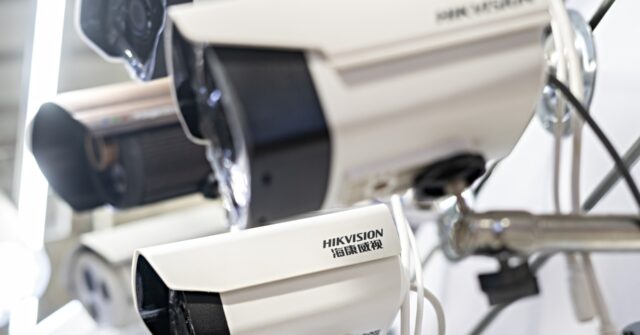The Canadian government on Friday ordered Chinese tech firm Hikvision to cease all operations in Canada because the surveillance company’s continued presence would be “injurious to Canada’s national security.”
Canadian Minister of Innovation, Science, and Industry Melanie Joly said the decision to shut down Hikvision Canada was made following a national security review under the Investment Canada Act (ICA), a 1985 law that regulates foreign investments.
The ICA and its amendments were intended to make foreign investors more comfortable with doing business in Canada, but also gave regulators latitude to ban investments that provide insufficient benefits to the Canadian economy or threaten national security.
Joly said Hikvision failed to meet the standards of a “multi-step review that assessed information and evidence provided by Canada’s security and intelligence community.”
Joly said that while the review “does not extend to Hikvision’s affiliate operations outside of Canada,” she strongly encouraged Canadians to “take note of this decision and make their own decisions accordingly” – strongly implying that dealing with any wing of Hikvision could put a customer’s privacy and security in danger.
The ruling included a ban on Canadian government purchases of all Hikvision products, and mandated a “review of existing properties to ensure that legacy Hikvision products are not used going forward.”
File/Photo taken on June 21, 2021 shows the flagship store of Hikvision in Yichang, central China’s Hubei province. Hikvision is the largest supplier of integrated monitoring products in China. (Costfoto/Future Publishing via Getty Images)
“The Government of Canada welcomes foreign investment – but will never compromise on Canada’s national security,” Joly’s statement concluded. Her ministry did not explain exactly why Hikvision failed the security review, or give the company an action plan for regaining access to Canadian markets.
Hikvision Canada was established in 2014. Its parent company is Hangzhou Hikvision Digital Technology Company Ltd., which is among the largest manufacturers of video surveillance equipment in the world. Hikvision is partly owned by the Chinese Communist government, and like all Chinese corporations – including nominally private enterprises – it is required by law to fully cooperate with Chinese intelligence services when they demand access to its data.
Hikvision was banned from selling equipment to the U.S. government in 2018. It was one of several Chinese companies added to the U.S. government’s “Entity List” for import restrictions in 2019 due to their role in the oppression of ethnic and religious minorities in China, including the Uyghur Muslims.
“This action will ensure that our technologies, fostered in an environment of individual liberty and free enterprise, are not used to repress defenseless minority populations,” Commerce Secretary Wilbur Ross said at the time.
The Federal Communications Commission (FCC) put heavy restrictions on Hikvision imports in 2022 because they could pose a threat to national security. Hikvision failed to overturn the FCC ban with a court challenge in February 2025.
Also in 2022, the United Kingdom ordered that Chinese-made surveillance equipment, including Hikvision products, could not be installed in “sensitive” areas due to the risk of espionage. Australia began removing Chinese-made cameras from government buildings in 2023.
Although commercial sales of Hikvision products were not banned in the United States, many top retailers stopped carrying the company’s products after its involvement in racial and religious persecution by the Chinese government was revealed.
Hikvision strongly disagreed with Canada’s decision, as did the Chinese Communist regime.
“Without any evidence, Canada has groundlessly accused Hikvision’s operations of potentially harming its national security and demanded the closure of our Canadian subsidiary. Such actions disregard facts, lack procedural fairness and transparency and amount to discrimination and suppression of a Chinese enterprise,” the company said in a statement released on Sunday.
“Instead of evaluating our technology on its cybersecurity merits, the decision appears to be driven by the parent company’s country of origin, reflecting broader geopolitical tensions and an unjustified bias against Chinese companies,” the statement said.
Hikvision representatives told China’s state-run Global Times on Sunday they believed Canada was “misinterpreting” China’s National Security and National Intelligence Laws – the laws that explicitly direct Chinese corporations to comply with intelligence requests – and were unfairly targeting Hikvision “due to the company’s state-owned shareholding structure.”
“The company urged the Canadian government to uphold the rule of law and take a fact-based approach, fostering a fair, just and non-discriminatory environment for global businesses, rather than acting on speculation and prejudice,” the Global Times reported.
The Chinese Embassy to Canada said on Saturday that Beijing “strongly deplores and firmly opposes” the Hikvision ban.
“We firmly oppose any wrongful practices of overstretching the concept of national security and abusing state power to discriminate against and suppress Chinese enterprises,” the embassy said.
The Chinese embassy told Canada to “change course immediately, stop abusing national security and politicizing economic and trade issues, stop the unjustified suppression of Chinese enterprises, provide a fair, just and non-discriminatory environment for the normal operation of Chinese enterprises, and do more to promote the sound and stable development of China-Canada economic and trade cooperation.”
“We will take all necessary measures to firmly safeguard the legitimate and lawful rights and interests of Chinese enterprises,” the embassy threatened.
Read the full article here


